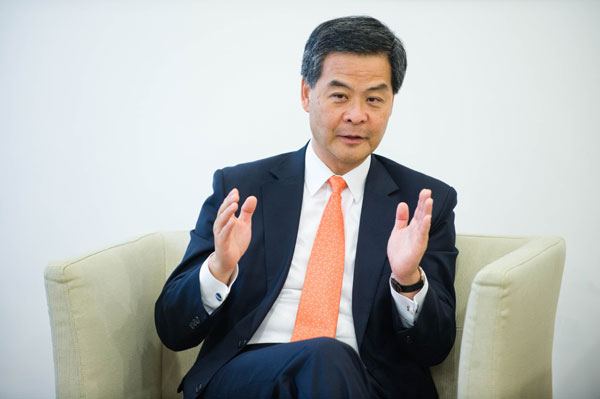Leung sets out vision for HK
Updated: 2012-06-25 09:28
By Xin Dingding in Hong Kong (China Daily)
|
||||||||
 |
|
Leung Chun-ying, newly-elected Chief Executive of the Hong Kong Special Administrative Region (HKSAR), gestures during an interview, April 11, 2012. [Photo/Xinhua] |
London, New York offer template for greater success, CE-elect says
In mapping out his vision for Hong Kong, Leung Chun-ying draws much of his inspiration from arguably the city's greatest rivals: London and New York.
Leung, the chief executive-elect of the special administrative region, said both cities are more advanced in several sectors - and that it is time to catch up.
The British capital offers key lessons on how Hong Kong can once again become a leading shipping hub, he told reporters recently.
"London, instead of shipping freight in and out of ports, offers services, including ship sales and rent, registrations, financing, management and insurance," said the 58-year-old, who studied valuation and estate management at Bristol Polytechnic (now the University of West England) in the 1970s.
These services offer greater economic value, he said. "If Hong Kong simply tries to double cargo throughput, it will expand its scale, but it will not take it to a higher level. We can do better than just expanding scale."
Hong Kong's ports used to be the busiest in the world, but that was before the rapid development of ports on the mainland.
Shanghai is now the world's largest port in terms of freight throughput.
Hong Kong's status as a world shipping center was being eroded, some feared.
China is now a major ship-building nation and it handles huge volumes of cargo so it needs a shipping center, and Hong Kong meets all the conditions, said Leung, who will start his five-year term on July 1.
Hong Kong's advantages include its multilingual workforce, international links and legal traditions, he said, adding that City University of Hong Kong has also established a research center for maritime and transportation law, and offers a master's degree in the field.
Hong Kong's future would be assured and advanced if the children of port workers can become maritime lawyers or insurance specialists, he said.
Hong Kong, as a financial center, also has room to improve, he said. It has often been mentioned in the same category as London and New York but Leung believed that there was no room for complacency and much work remained to be done.
"Just take a walk in Hong Kong's financial district, and then in London and New York, and you can feel the difference," he said.
More financial services have yet to be explored, he said. He cited, as an example, that while every bank in Hong Kong knows how to finance real estate, "not every bank knows how to do financing for ships".
The mainland, with its resources and production capabilities, will create opportunities that Hong Kong can grasp to elevate itself as a financial center, he said.
"I have a lot of confidence in Hong Kong's future economic well-being. We can clearly see the direction ahead of us," he said.
The incoming chief executive also wants to tackle poverty levels.
He conceded that Hong Kong has a wide wealth gap. But "the gap itself is not my concern. I'm concerned about those living on incomes that are too low" and are impoverished, he said, adding that the solution is not necessarily "to narrow the wealth gap".
One of the measures his administration will adopt will be to improve the standard of living of those that are marginalized through "a secondary distribution of wealth", such as building more public housing while trying to stabilize real estate prices.
He also advocates greater communication with those on the lower rungs of the wealth ladder.
One of his ideas is to provide more quality employment opportunities. He cited Yuen Long residents, saying they had to commute two hours a day to hotels in Tsim Sha Tsui or Mong Kok to work as cleaners.
What they suggested was that the government should allocate land in the district for developers to build hotels to accommodate mainland tourists who come through Shenzhen, so that they can work near home, take care of their families and save precious time.
Leung called the idea "brilliant". "Chinese people have the ability to make a living with their own hands. Our government looks forward to better satisfying workers' needs over the next five years," he said.
xindingding@chinadaily.com.cn

 Relief reaches isolated village
Relief reaches isolated village
 Rainfall poses new threats to quake-hit region
Rainfall poses new threats to quake-hit region
 Funerals begin for Boston bombing victims
Funerals begin for Boston bombing victims
 Quake takeaway from China's Air Force
Quake takeaway from China's Air Force
 Obama celebrates young inventors at science fair
Obama celebrates young inventors at science fair
 Earth Day marked around the world
Earth Day marked around the world
 Volunteer team helping students find sense of normalcy
Volunteer team helping students find sense of normalcy
 Ethnic groups quick to join rescue efforts
Ethnic groups quick to join rescue efforts
Most Viewed
Editor's Picks

|

|

|

|

|

|
Today's Top News
Health new priority for quake zone
Xi meets US top military officer
Japan's boats driven out of Diaoyu
China mulls online shopping legislation
Bird flu death toll rises to 22
Putin appoints new ambassador to China
Japanese ships blocked from Diaoyu Islands
Inspired by Guan, more Chinese pick up golf
US Weekly

|

|






